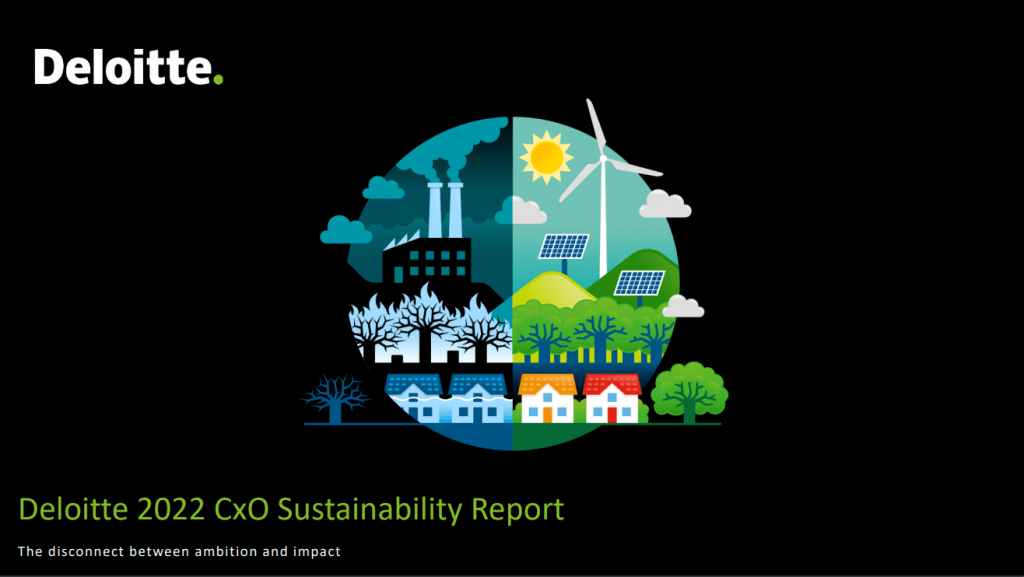
The Rising Importance of Sustainability Action in 2022.
Deloitte’s research highlights rising importance of sustainability in 2022.
Deloitte’s 2022 Sustainability Report: The Disconnect Between Ambition and Impact, reveals the rising importance of sustainability, due to the immense threat of climate change, with 97% of companies already feeling the effects of climate change.
Building on previous research, Deloitte engaged with more than 2,000 Business Leaders across 21 countries, investigating concerns and actions related to climate change and sustainability. The majority of business leaders are struggling to fully embed sustainability into their core business strategies, operations, and cultures, despite 89% percent of leaders agreeing there’s a climate crisis, with 63% describing their organisation’s concern.
The report explores the disconnect between company ambition and impact, including steps business leaders can take to bridge the gap.
“Climate change is no longer in the distant or even near future. It’s here now and the choices we make today will determine the quality of life for generations to come,” says Jennifer Steinmann, Deloitte Global Climate and Sustainability Marketplace Leader. “A better future depends on a profound and lasting change in attitude and behaviour from governments, businesses, and individuals. The business community can help model new forms of cooperation that identify the best ideas, regardless of source—and create new and lasting solutions that will have the greatest impact for them, their stakeholders, and their communities.”
Change Motivators in favour of Sustainability
88% of Company Directors, demonstrating leaders are increasingly cognizant of the need for immediate action to dampen the worst effects on the planet. However, the data from Deloitte shows business executives are experiencing tangible pressure from their stakeholder groups, and:
- 97% of leaders indicated their companies have already been negatively impacted by climate change, including half of companies facing operational impacts (e.g., disruption to business models and supply networks worldwide).
- Over the last 12 months, 81% percent of business leaders have been personally impacted by a climate event (e.g., extreme heat, worsening storms, wildfires).
Greater Benefits to Climate Strategy
Two-thirds of organisations are now using more sustainable materials, and more than half are adopting climate-friendly machinery, technology, and equipment. The majority of businesses are also intentionally reducing air travel and providing training on their climate actions and impact.
“No action is insignificant, but certain activities and decisions ‘move the needle’ more than others, and those bolder actions from business leaders are needed now—while there’s still time to limit the damage. It’s time to prove we’re up to the challenge.” ~ Deloitte Global CEO Punit Renjen.
Deloitte’s analysis of the report has identified five
actions which, especially when taken together, demonstrate a deeper understanding of the business benefits of sustainability:
- Developing new, climate-friendly products or services;
- Requiring suppliers and business partners to meet specific sustainability criteria;
- Updating or relocating facilities to make them more resistant to climate impacts;
- Incorporating climate considerations into lobbying and political donations; and
- Tying senior leader compensation to sustainability performance.
According to Deloitte’s report, business leaders also chose brand recognition and reputation, customer satisfaction, and employee morale and well-being as three of the four top benefits of their companies’ sustainability efforts, suggesting many leaders see climate actions as beneficial to their relationships with their stakeholders.
The lowest-ranked benefits (revenue from both longstanding and new business, asset values, cost of investment, and operating margins) suggest organisations continue to struggle with the short-term costs of transitioning to a low carbon future.
Actions and Characteristics which set Climate Leaders apart
19% of the sample’s own organisations serve as role models for tackling sustainability with efficiency and effectiveness, while reaping the benefits in return, having implemented at least four of the five sustainability actions. Comparing these with 35% of the total haven’t implemented more than one action, these leaders are:
- More concerned about climate change (74% versus 52%);
- Expecting climate change to have a high impact on their business strategies in the coming years (73% versus 50%);
- Planning to achieve net-zero emissions by 2030 (82% versus 50%);
- Less likely to see cost as an obstacle for sustainability efforts, indicating they may have a better understanding of the costs associated with inaction and have greater senior leader buy-in; and
- More likely to understand the business opportunity of sustainability to their bottom lines, stakeholder satisfaction, and general broader performance.
”Not all businesses are at the same stage in their climate journeys” says Renjen. “These actions are important markers of leadership as they require having a mindset that sees both the risks of inaction and the opportunity of sustainability, a culture that embeds climate directly into business strategy, buy-in from senior leaders, and the ability to influence third parties, including business partners, government, and regulators.”
Read more: You can read more from the Deloitte’s 2022 CxO Sustainability Report on Deloitte’s website.





